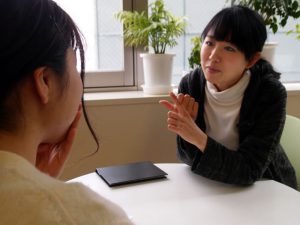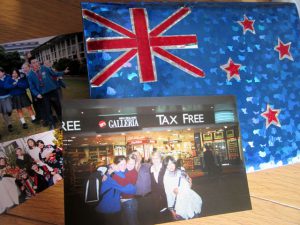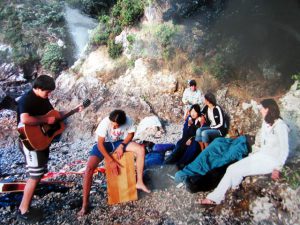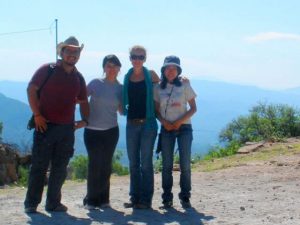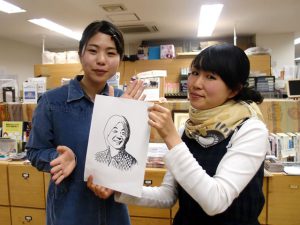[Original by Yuka WATANABE, 2015 Public Relations Intern (April 8, 2016); Translated by N. Mizutani/A. Senkoff]
Hello. This is Yuka Watanabe, the 2015 Public Relations intern. Our 15th interview will be an interview to Ms. Maki Kato, who is in charge of our Afghanistan project. Ms. Kato is fond of studying foreign languages and has learned quite a few languages. At the present time, she is studying Pashto, which is the language spoken in Afghanistan. I would like to interview about her international career since high school!
Why did you decide to work in the field of international cooperation?
When I was in the first grade of senior high school, I attended a high school in New Zealand for a year. That was a big event for me because I was born in the countryside of Japan where we had few intercultural experiences. I first learned English at junior high school in Japan and thought it was fun. So I simply thought it might be a good idea to live in an English-speaking country when I become a high school student. My parents, who had never been abroad, were more worried than myself.
Although my original purpose was to experience life in an English-speaking country, I had unexpected encounters with students from Latin American countries such as Argentina, Chile, Venezuela, Bolivia, Paraguay, and Costa Rica. This was a big culture shock for me. They were easy-going people who love to sing and dance. Moreover, they are careless about time and always seem to be happy, hugging with each other. They express their feelings so openly with a trill (in Spanish)! They were totally different from me and my Japanese friends, who are shy and courteous. As we became good friends, my interest toward Latin America gradually grew and I became very interested in their countries.
In the beginning, I was simply attracted to their passion and energy, but as I studied and learned about their life in detail, I became interested in the issues of poverty and inequality. So when I entered university, I decided to study abroad in a Latin American country. I participated in an exchange student program and studied in Mexico for a year. In addition to studying, Mexican students have to volunteer for social work. I became a member of my university’s volunteer program because I wanted to experience life outside university. That was my first opportunity to think about international cooperation seriously.
While some of the wealthiest people in the world reside in Mexico, the same city has slum areas with insufficient infrastructure. It is said that more than half of all Mexican citizens live below the poverty line. People who live in totally different circumstances live in the same country, so close to each other. I wondered, “What has caused this inequality?” While studying at a peaceful and wealthy university on weekdays, I continued volunteer activity in the slum areas on weekends. For the first time in my life, I learned that there was massive inequality in the world. I became deeply interested in the social structure of Latin America, to which I had been attracted since high school, and started to think seriously about working in the field of international cooperation.
What did you do after graduating from University?
After graduating from a Japanese university, I decided to go back and study in Mexico again. I wanted to stay longer in Mexico! One-year experience of the exchange program was too short for me. This time, I was strongly determined to major in area development management, and chose a university, which had a course designed for my major. Students were divided into groups and worked in an area assigned to them. We studied, not only in the classroom but also in the field, to make a more comfortable life for local people.
I worked in a village of indigenous people, and the aim of our project was to improve their quality of life. This was a collaborative project of villagers, our university and local NGOs. Currently, I am in charge of the JVC Afghanistan project, where for security reasons, I can rarely engage in fieldwork. When I need to imagine what life in a village is like, I recall my experiences during this project in Mexico. Of course Afghanistan and Mexico are different countries and have completely different cultures. Still, I remember those days; the hard times we had when we tried to work together and the influence that outsiders, like ourselves, can bring to the village. Without my experience in the village, I would not even have the slightest idea of what it was like.
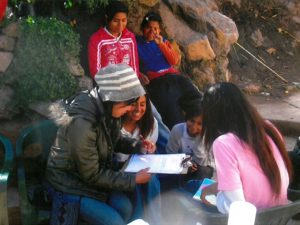
If you want to know about the sheep, you should ask the children who are taking care of them. The lady wearing a knit cap is Ms. Kato. She is listening to the children’s stories.
In the village, I participated in the “sheep project.” In this project, first, we distributed sheep to several households which were chosen by the villagers. Subsequently, we gave out newly born lambs to other households. We continued breeding sheep, and tried to increase the villagers’ income by selling meat. Meanwhile, we conducted thorough research on issues such as the number of lambs which were born and died, the cost to feed them, the order in which to give out the sheep, and the final price of the sheep. The birth and death of sheep were dramatic events for us. I spent a year with the villagers, sometimes happy, sometimes sad, and always tried to improve the situation. My biggest lesson there was that I learned which person in the village I should ask for advice when I was in trouble.
At community gatherings, the speakers were mostly males. However, in reality, males are not in the village but are working in town on weekdays. Women and children are the ones who are actually taking care of the sheep. Even when men said they were doing OK, that was not necessarily true. So I would secretly ask women and children what they thought and they would have different opinions.
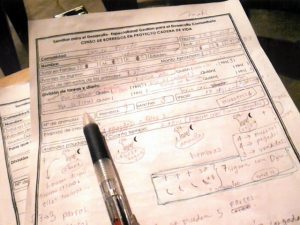
Sheets used for investigation. Since many people do not know how to read, she often used symbols to communicate.
We needed to pay attention to those who are actually taking care of the sheep, not only those who speak out. I learned that it was critically important to go out and find out the truth myself.
Your experience in Mexico has lead you to your current job. How did you get your job at JVC?
After finishing my major, I found a job at a local NGO in Mexico. However, the security of the area deteriorated and I finally decided to come back to Japan. I was awfully disappointed because I was not able to accomplish my aim. When I was a university student in Japan, I used to work at JVC for a year as an advocacy intern, because I wanted to learn about international cooperation at an NGO. After returning from Mexico, I talked to a JVC staff member, who used to be my colleague. I heard that they were recruiting staff members, and decided to apply for the position.
I had always wanted to become a JVC staff member since I finished my internship. My wish had come true much earlier than I expected. I greatly sympathized with the philosophy of JVC, which is to constantly support people at the grassroots level. I was ready to work anywhere. The position open at that time happened to be a position to be in charge of the Afghanistan project. So I switched from the joyful Latin atmosphere to the heavy Muslim mood. Thus, I got involved in Afghanistan.
How do you like being a JVC staff member?
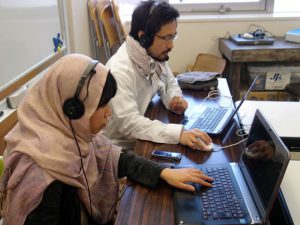
Skype meeting with village elders. It is important to take local culture into consideration. Thus Ms. Kato is wearing a scarf in order to avoid exposure of the skin.
I have been a staff member for five years and I have fallen in love with Afghanistan. It’s my favorite country. I can rarely go there, but I communicate with the local staff through Skype and e-mail every day.
At Afghanistan, JVC supports villagers’ activities to prevent disease and promote education. We would like to understand the reality of the villagers’ lives and their goals. We are trying to find out what we, outsiders, can do to improve their life. Of course, the most important thing is to have background knowledge about the conflicts in Afghanistan and people’s customs and culture.
This is sometimes hard, when you are far away from that place. After working with the Afghan people for four years, I still have much to learn and continue to make new discoveries. Our local staff are very friendly and charming, just like us. On the other hand, I sometimes feel that we are living completely different lives, especially when I hear about what they have lost during the long conflicts. Many people have lost their families, dreams, and have experienced life as refugees. Therefore, we should cooperate and support each other as much as possible.
[My impression after interview]
Among the staff members I have interviewed, Ms. Kato’s passion toward international cooperation was stronger than anyone else. She has the ambition and strong energy to know more and to realize her goals. That’s why she never forgets to study Pashto. She is so cool!
* The order of uploading the English version of “Staff Interview” is random and hence different from the order of the original Japanese version. We are sorry, but the person coming next may be different from the “next person to be interviewed” mentioned in the text.
Share This:
